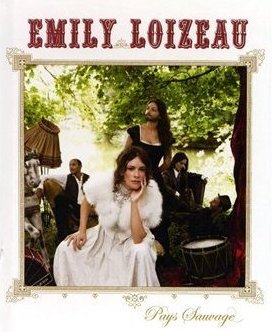Aidan Curran posted on September 19, 2009 19:00
Regular readers of this blog will be familiar with how we rave about Emily Loizeau. Her awesome 2006 debut album, 'L'Autre Bout Du Monde', was stuffed with brilliant piano-pop tunes that swung between joyous optimism and dark melancholy, sometimes even in the same song. It's quite similar in style, mood and quality to Duke Special's equally-brilliant 'Songs From The Deep Forest', and the two have appeared on stage together in Paris and Belfast.
 Loizeau's second album, 'Pays Sauvage', came out in France earlier this year and looks likely to get a UK and Ireland release this autumn in support of her series of British concerts. (No news yet of an Irish show.)
Loizeau's second album, 'Pays Sauvage', came out in France earlier this year and looks likely to get a UK and Ireland release this autumn in support of her series of British concerts. (No news yet of an Irish show.)
With Loizeau's second record comes those dreaded words: new direction. For the most part, 'Pays Sauvage' is an album of French-and-American-flavoured folk songs, like a Parisian music-hall revue camping in the Appalachians. The piano is gone: the dominant sounds are acoustic guitars, flutes and hand-held percussion. Brief snatches of children's voices are heavy signals of the innocence and playfulness that this album aims to capture. (The title translates as 'natural/unspoilt country'.) Nouveau folkies like Herman Dune and Moriarty are guests.
Loizeau's new style has influenced her songwriting. The tracks on her debut had carefully-crafted melodies where verses built up pressure that was released in dramatic choruses - but these new songs are altogether looser in structure. First single 'Sister' feels like a fireside singalong, while 'Fais Battre Ton Tambour' (which translates as 'Beat Your Tambourine') has a call-and-response format. And the title track dashes around dramatically like a modern dance troupe running to one side of the stage and then back again.
So is it any good? Well... hmmmmmm. Loizeau's effervescent personality still shines through, while her voice - sometimes clear and piercing, other times understated and intimate - is rich in character and unforced emotional strength. And fair play to her for having the courage to change her sound so radically.
But we have two major reservations about this album:
First, the bohemian folk-pop sound is a bit fashionable in France these days. Everyone's at it. As well as the aforementioned Herman Dune and Moriarty, you have Cocoon and Yael Naim enjoying huge success. (In fact, listening to 'Pays Sauvage' and looking at its cover photo reminds us of Naim's single 'New Soul' and its happy-clappy, hippy-drippy video.) Our point is that her debut album sounded like none of her peers but her second album sounds like quite a lot of her peers. Perhaps inadvertently, Loizeau has hitched her trailer to a bandwagon.
Second, with the relaxed vibe of her new acoustic folk sound, it feels like the hard work of songwriting craft has been neglected. The songs on 'Pays Sauvage' are all decent and often good - but nowhere near the quality of her debut tracks and their strong, soaring melodies and hooks. Compare 'Pays Sauvage' to another 2009 folk-flavoured second album, Alela Diane's 'To Be Still'. The young American has progressed from the ramshackle shanties of her likeable debut to the towering and carefully-built songs of her magnificent new record, without losing anything from her style or personality. By contrast, Loizeau seems to have made the reverse trip - from artisanship back to rough improvisation.
This follow-up is a decent album but Loizeau had set the bar much higher for herself with that fantastic debut. Unfortunately, 'Pays Sauvage' is a mis-step.
You can listen to tracks from 'Pays Sauvage' on Emily Loizeau's MySpace page. Here's the video for 'Sister':
More ...
[Read More...]